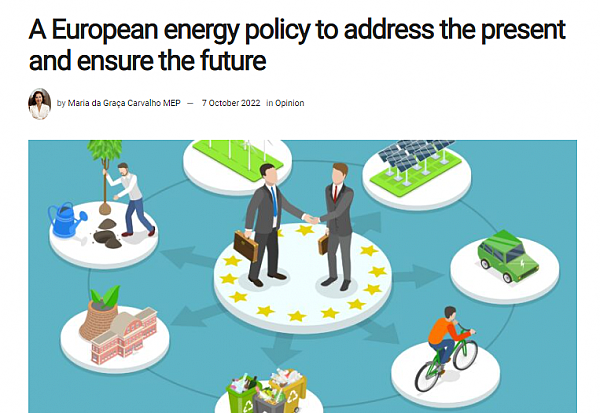Imprensa A European energy policy to address the present and ensure the future
Inflation, dictated by rising energy prices, is today the biggest concern of Europeans. Our households, businesses, and industries are facing growing difficulties. The added factor of uncertainty is contributing to undermining our economies, with many Member-States facing the risk of returning to recession at a time they were recovering from the effects of the COVID-19 pandemic. Exceptional circumstances require exceptional measures and now is clearly the time to act swiftly and decidedly.
A price cap on gas prices was always a possibility on the table and it now seems closer to becoming a reality. The European Commission is more open to this line of action, at least regarding gas used for electricity production, as is already the case in Portugal and Spain, and a majority of Member States have been advocating for it for quite some time.
Personally, I do not see this as a real solution but rather an emergency measure that carries new risks. Especially in terms of security of supply. It is never a good idea to interfere with the normal functioning of the markets. At a time when the gas market is strongly unbalanced in terms of demand and supply, the EU faces a serious risk of seeing the suppliers it found to replace Russia, namely LNG suppliers, turn their attention to other buyers willing to continue to buy gas at a premium. A possible increase in demand, linked to lower prices, is also something to be considered.
That said, it is true that the gas market, and in consequence energy markets as a whole, are not functioning normally. Because Russia invaded Ukraine and because, even before the war, Russia was already manipulating, which in fact it continues to do. Therefore, a temporary cap on gas prices, at least for specific purposes or covering specific suppliers, is a necessary evil that we might need to accept. Nevertheless, our urgency to act should not be confused with hastiness. All scenarios and implications have to be considered before we reach a decision on this subject.
At the same time, we need to continue to look for real short and long-term solutions that will ensure Europe’s energy sovereignty, while keeping in line with the Green Transition goal of producing clean and affordable energy for our citizens and businesses.
Most of the necessary steps to achieve this are covered by the resolution approved this week by the European Parliament, in Strasbourg.
Notably, the connection between our 2030 climate commitments and Europe’s energy independence and security. The resolution remembers that energy efficiency and energy-saving measures will not only help the EU in the short term but will also help us to achieve our climate goals. It emphasizes the need to accelerate the deployment of renewable energy, including renewables for self-consumption, as it will help end dependency on natural gas.
It also addresses the systemic changes that need to happen in order to ensure that Europe will be better prepared to deal with future crises.
The creation of a fully integrated single market for energy provides for a truly resilient European energy network. A network reinforced by the construction of new interconnectors, such as the gas interconnection between the Iberian Peninsula and France, because this crisis has already shown us that gas is, and it will continue to be for a while, a critically important transition energy source for Europe. The development of better trading platforms is able to alleviate the price pressure in the short-term and improve our resilience in the future. The upgrade of the EU Energy Platform, in order to transform it into a tool for the joint procurement of energy sources in order to strengthen the EU’s bargaining power and lower the cost of imports.
Of course, the resolution does not forget other measures and intentions that are already on the table, including revenue caps for energy produced from renewable sources (inframarginal generation), windfall taxes for the fossil fuel sector, or a reform of the electricity market design.
In the specific case of windfall taxes, I personally do not favor this measure, as it could have a negative impact on investment. But the European Parliament does not close any doors. What it cannot accept, as is expressed in the resolution, is being left out of the decision-making process. In this circumstance, the Commission proposed its plans in the form of a Council regulation, using Article 122 TFEU as the legal basis, instead of a legislative co-decision procedure. In the end, the European Parliament is the only European institution whose members reflect the direct choices of Europeans. And it is for the present and future of Europeans that we are all working for.

